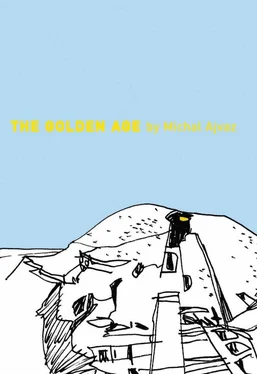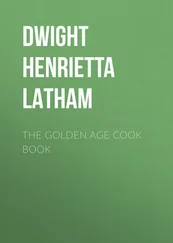Michal Ajvaz - The Golden Age
Здесь есть возможность читать онлайн «Michal Ajvaz - The Golden Age» весь текст электронной книги совершенно бесплатно (целиком полную версию без сокращений). В некоторых случаях можно слушать аудио, скачать через торрент в формате fb2 и присутствует краткое содержание. Год выпуска: 2010, Издательство: Dalkey Archive Press, Жанр: Современная проза, на английском языке. Описание произведения, (предисловие) а так же отзывы посетителей доступны на портале библиотеки ЛибКат.
- Название:The Golden Age
- Автор:
- Издательство:Dalkey Archive Press
- Жанр:
- Год:2010
- ISBN:нет данных
- Рейтинг книги:4 / 5. Голосов: 1
-
Избранное:Добавить в избранное
- Отзывы:
-
Ваша оценка:
- 80
- 1
- 2
- 3
- 4
- 5
The Golden Age: краткое содержание, описание и аннотация
Предлагаем к чтению аннотацию, описание, краткое содержание или предисловие (зависит от того, что написал сам автор книги «The Golden Age»). Если вы не нашли необходимую информацию о книге — напишите в комментариях, мы постараемся отыскать её.
is Michal Ajvaz’s greatest and most ambitious work.
The Golden Age
The Golden Age — читать онлайн бесплатно полную книгу (весь текст) целиком
Ниже представлен текст книги, разбитый по страницам. Система сохранения места последней прочитанной страницы, позволяет с удобством читать онлайн бесплатно книгу «The Golden Age», без необходимости каждый раз заново искать на чём Вы остановились. Поставьте закладку, и сможете в любой момент перейти на страницу, на которой закончили чтение.
Интервал:
Закладка:
Perhaps, he thought, many artists and thinkers have come across these motions, but all took fright at them, seizing instead on an understanding of beauty as expressed by an order (in a way this is simple to achieve: in the proximity of beauty it is always possible to find some kind of order which resembles it, because such orders use as their blueprints constellations opened up by the blind motion of beauty) even if they made the same assumptions as he, that beauty was a tumultuous clash of the emergence, transformation, perseverance, hardening and dissolution of order, that symmetry and chaos, maturation and decay, organization and dissolution were figures in the game but were indifferent to it and closed into themselves; that beauty was a poison which circulated in systems, providing them with a force for the creation of chaos (chaos can only be governed by a force which has roots as dark as its own and which gushes from the same source) while it ate away at them and destroyed them, captivated them by a blissful vision of death so as to paralyse them and urge them towards the most distant flashes of its flame. Baumgarten knew, too, that beauty is so much present in these continuous leakages that it conceals itself in them, that we always catch sight of it in a constellation just as it is disappearing; the next moment all that is left to us is a faithful copy, a mask produced with its own skin by which it intends to call our bluff.
He dreamed of a book which he would call “On the Origins of Beauty,” a book which would be a hymn to beauty’s fascinating revoltingness and also a catalogue of the figures of the dark motions of being and an attempt at the determination of the principles of their choreography. The book in gestation became the one thing of any importance in a life without family, lovers and friends. And as he sensed that the motions he was writing about exercised a clandestine control over his writing, that they agitated the tip of his pen as it moved across the paper, he sensed also that the circle was closing, thus bringing a certain unity into his life. Admittedly this unity reminded him of the motion of plankton in stagnant water and was probably the work of a devil of some kind, yet it brought him a continuous silent joy: after a long time something had appeared in his life which bore a likeness to harmony. He got into the habit of taking long walks across the open country above the city, along the roads which skirted Prague; while on these destinationless trips he would ponder his book. The larva-like motions were also supreme in the realm of sight; in open country they flickered along the outlines of visible objects so that often he found the answer to his own question by looking at a roadside tree or a pile of junk in a garden.
Then all of a sudden the tremblings of the world ceased, the unborn book closed, the landscape abandoned the production of ideas. By now he was so familiar with the world of larva-like motions that he knew long periods of torpor to be part of their life, that he would have to accept this peace just as they did, but he lacked the courage to give up the only thing which still satisfied him. Baumgarten continued to pace the open country above Prague in the hope that as before some rust-stained oddments next to a wall or a torn colour poster on a wooden board would give rise to ideas.
On one such hopeless walkabout he strayed further from the city than usual. He became aware of this only once he noticed that the houses had taken on a different aspect; no longer were they distracted by the proximity of the great capital, no longer did they look beyond the horizon to the city but inwards to their own yards, all the time contemplating the country around them. In the village squares there were no longer city-bus stops, their timetables behind opaque glass; in their place were corrugated-iron huts surrounded by stinging nettles. In one of the villages they told him at the pub that the last bus to Prague had already gone. Fortunately it was a Saturday and he would not be going to work the next morning. He asked if there was anywhere in the village he could sleep and one of the men seated at the table told him he could make himself a bed of straw at the farm on the opposite side of the square. Baumgarten was tired and in need of sleep, so he finished up his second beer and left the pub. Beyond an empty concrete storage tank, on whose bottom there was a foul-smelling black ooze, the gates of the farm opened wide. He entered the rutted yard; on one side there stood a large barn, on the other the white wall of a windowless building against which sundry agricultural implements and assorted junk had been left. Men and women in overalls kept coming into the yard to prop more shovels, rakes and hoes against the wall. He went into the barn, lay down in the straw and fell asleep immediately.
Ino of the beautiful ankles
When he woke up it was just getting light and everyone else at the farm was still asleep. Soon the cock began to crow, the only sound to be heard in the village. Baumgarten lay on the straw and looked into the yard through the open door of the barn. For a while he thought of his book, but soon he emptied his mind of these thoughts and left it empty. He let his eyes wander over the objects leaning against the blind wall of the building; most of these were farm tools the names of which he did not know, or parts of things of which it was impossible to say what they had once belonged to. By now there was a pink strip of light across the top of the wall, but all the tools and parts remained submerged in the cold shadow that covered the yard. To the left of the gate leading to the square there was a rusty instrument composed of four poles fastened together by rivets out of which there projected soil-covered prongs; he told himself that this was probably a harrow, though he knew very little about the subject. Leaning against the wall to the right of this were two dark beams, crossed, beaten together at their centres to look like a great “X” he imagined these forming part of a framework used in the cutting of wood. Resting against this rotten saltire were the remnants of a dilapidated door, upon which were quivering the flakes of a cream-coloured varnish with which the door must once have been painted; the door’s centre panel still bore a brass handle. Surely, thought Baumgarten, the farm’s manager was an exceptionally frugal character to hold on to junk such as this; at the same time it struck him that what was left of the door looked like a large “E.” He began to see amusement in a game in which one read letters in farm tools etcetera, so he moved on to the next object, a triangular wire sand sieve, but he could not think of a letter to compare this with. Next to the sieve there was the handle of a shovel, an obvious “I,” followed by a rusting construction of some kind made of the type of pipes used in scaffolding, a passable approximation of the letter “H.” The last item in this group of objects comprised three planks propped against the wall, which for some reason had been nailed together; it was not difficult to will himself to see in these the letter “N.”
Baumgarten ceased to find amusement in the game. He had not succeeded in his attempt to transform all objects into letters, nor did “XE” or “IHN” have any meaning to disclose. He was almost ready to get up and walk into the yard when something dawned on him: the harrow and the sand sieve did not resemble any letter of the Latin alphabet, but it was possible to see in them perfect representations of sigma and delta . Which would mean that “X” was in fact “CH” and the “H” of the scaffolding was “É,” so that the complete group of old objects read schedién , the accusative form of the Greek word for raft . Baumgarten resumed his game, this time reading the object-letters in Greek. The first item in the next group was a metal stand that was held stable at the bottom by a transverse bar and had a metal spool attached to its top in which was gathered a steel cable with frayed ends; all this was covered in rust, like all the metal objects in the yard. The stand was a fine representation of the letter “A.” Next to this were two wooden poles joined at an angle by insulating sleeving, whose purpose he could not imagine and which formed the letter “N” (the second in this curious notice); to the right of this was the broken lid of a crate in the shape of an “E,” and in two columns of some kind of plastic that were joined by a rubber belt gone slack, an “M” was clearly visible. At this point Baumgarten became truly agitated: the murmur of a text was beginning to take shape in his head, a text drawn out from the depths of his memory. He closed his eyes and caught hold of the words, which he uttered in a muted voice.
Читать дальшеИнтервал:
Закладка:
Похожие книги на «The Golden Age»
Представляем Вашему вниманию похожие книги на «The Golden Age» списком для выбора. Мы отобрали схожую по названию и смыслу литературу в надежде предоставить читателям больше вариантов отыскать новые, интересные, ещё непрочитанные произведения.
Обсуждение, отзывы о книге «The Golden Age» и просто собственные мнения читателей. Оставьте ваши комментарии, напишите, что Вы думаете о произведении, его смысле или главных героях. Укажите что конкретно понравилось, а что нет, и почему Вы так считаете.












